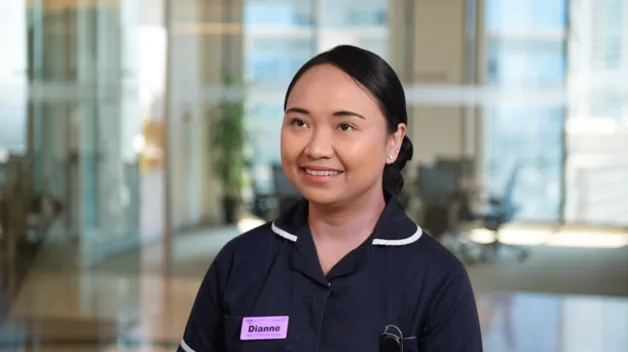You've just been diagnosed with pancreatic cancer. What to do next
There’s no right or wrong way to feel in the days and weeks after a pancreatic cancer diagnosis. You might be processing a lot, trying to make sense of new information, or simply focusing on what’s in front of you, all of that is completely okay.
Whether you’re gathering information or just looking for a place to begin, we’re here to help you find your way, one day at a time.
Steps you can take after a diagnosis
Understanding what your diagnosis means can help you have more clarity around your treatment and care options.
What you can do:
- Write down any words you don’t understand and ask your team to explain them
- Learn what resectable, locally advanced, or metastatic mean, these terms affect treatment options
- Ask your doctor these initial questions:
- What type of pancreatic cancer do I have?
- What stage of the disease do I have?
- Has my pancreatic cancer spread? If so, how far?
- Is my cancer in the advanced stages? If so, what can be done to help me?
- How is pancreatic cancer treated? What are my treatment options?
- Will I have surgery, chemotherapy or radiotherapy?
- What is the intent of my treatment?
- Are there clinical guidelines for the treatment of pancreatic cancer? If so, how can I see them?
- Who will be my main contact person?
- I am feeling frightened about what will happen to me: who can I talk to about my feelings?
- What practical help is available for me?
If you don’t understand any of your doctor’s answers, ask: ‘Can you explain that again?’ or ‘I am not sure what you mean by that.’ The most important thing is you feel you understand what is going on so you can make informed decisions about your treatment and care.
- Visit our Glossary to help explain medical terms in plain language
Explore: What is pancreatic cancer? | How is it diagnosed?
Having your test results, reports and referrals in one place will help you stay organised and involved in decisions.
You may find it helpful to:
- Write down the names and contacts of your main healthcare professionals and their role
- Keep a notebook or folder with your information, you can use the space in the Living With Pancreatic Cancer booklet too. You can order the booklet online or call us for a copy
- Ask about genetic or tumour (molecular) testing and if it is applicable to your circumstances
Your GP will refer you to a specialist. The key is a multidisciplinary team (MDT) approach, which is a group of specialists who work together to plan your treatment.
This team might include:
- A surgeon, oncologist, nurse coordinator, dietitian, GP and more
- A supportive care team, even early on, to support quality of life
What you can do:
- Ask your doctor to explain who’s involved in your care
- Check whether your care is being provided through a high-volume centre (these may offer better outcomes)
Your treatment for pancreatic cancer will depend on your diagnosis, overall health, and what matters most to you. It might include surgery, chemotherapy, radiotherapy, or supportive care. Visit our Treatment page for more information including important questions to ask your doctor.
Questions to ask:
- What is the goal of this treatment: cure, control, or symptom relief?
- What are the side effects and how can I prepare?
- What support is available for things like diet, transport or emotional wellbeing?
- How soon do I need to decide?
Your preferences matter, don’t hesitate to speak up about what’s important to you.
Learn more: Treatment options | Diet and Nutrition | Managing Symptoms
Living with pancreatic cancer affects many parts of life. Support is available, for emotional wellbeing, finances, transport, carer and loved ones, and more.
You can:
- Ask your nurse or GP about local support services
- Let your support network know how they can help, it's okay to ask
Helpful resources: Living with Pancreatic Cancer | Carers Support | Pancreatic Cancer Support Groups | Pankind Australia
Clinical trials are research studies testing new treatments or approaches. They may offer options that aren’t yet widely available.
What to consider:
- Ask your oncologist if any trials are suitable for you right now
- Find out what the trial involves and how it compares to standard treatment
- Participation is always your choice, and you can withdraw at any time
Getting a second opinion is a common and completely acceptable step. It can give you added clarity, confirm your treatment plan, or introduce other options. Some people find it helps them feel more confident and informed about the path ahead.
You don’t need to feel uncomfortable about asking, healthcare professionals understand that people often want another perspective, especially when facing a complex diagnosis.
What you can do:
- Ask your GP or specialist to refer you for a second opinion. You don’t need permission, it’s your right.
- Let your current team know you're seeking a second opinion; it may help with coordinating information and care.
- Take printed or digital copies of your reports and test results to your appointment.
- Use telehealth if it’s difficult to travel, many larger cancer centres offer virtual appointments.
- If you’re in a regional or rural area, ask your team if there’s a specialist pancreatic cancer service you can connect with.
A second opinion doesn’t mean starting over, it’s about making sure you feel informed and confident about your care.

Contact Dianne, Support Navigator
on 1800 003 800 for information and find out about the services and support that may be available for you and your family.
